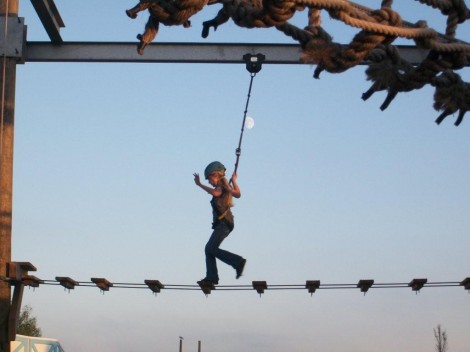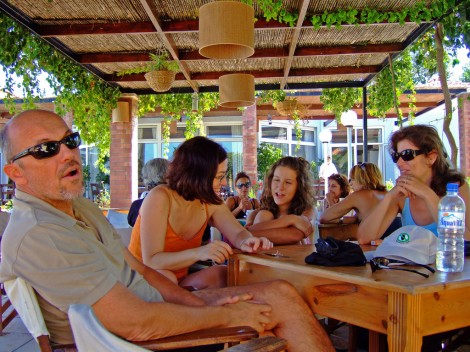
We're only weeks away from the start of the holiday season. In fact, people are already starting to take off for some summer sun. One PlayPennies mum, Clarissa (mum to two lively lads aged 4 and 2) is packing her bags today. She's taking advantage of the what might be the last chance to take a term time holiday without being fined, yelled at by the school or visited by a truancy officer!
In the coming weeks we'll be covering all sorts of ways to save money while on holiday. But to kick this off, I'm looking at the first, most important way to spend less when it comes to your holiday. Don't get scammed.
According to the Office of Fair Trading (OFT), UK holiday makes lose an estimated £3.5 billion each year to scams. What I found scary though is that the OFT also found that if you are scammed, you're 30% more likely to fall for another scam in the following year. Here's how to avoid being one of them.


Fake Holidays
According to Which? the consumer magazine, buying holidays off fake companies is the first scam you're likely to encounter.
What can you do to avoid them? Well Which? advises that if a deal looks too good to be true then it is and you should walk away. The problem is, we're all looking for that super amazing bargain, and we know that they're out there.
How to minimise your risk of falling for a bogus company? You could try looking up similar experiences on the Holiday Watchdog site. Chances are good that someone else has fallen for it, and if they have then this is where they'll come to rant about it.
It is a good website to bookmark anyway, as there are customer reviews on just about every resort and location.
Don't buy from a company that isn't a member of ABTA or AITO. Take their membership number, and call the organisation to check they're legitimate. These organisations also offer you some protection in case anything happens, but it is complicated so do check this out before you go, and before you have to rely on them.
Always use a credit card
You've also got some protection if you pay by credit card. A legitimate company will be happy to take at least a Visa card, and you should pay this way where you can according to the Citizens Advice Bureau (CAB). There Problems With Holidays site is recommended reading before you book or go on any holiday but particularly a package holiday.
If they try to get out of it, say they don't accept cards, or they are going to some lengths to stop you using a card like making the process complicated or excessive charges, then this is a potential sign they're a fake company.
If they're a limited company then you can check them out at Companies House. All limited companies have to be registered, and you can find out exactly who it is that you're doing business with for a £1 fee.
If you're buying a package holiday from a legitimate company, then you're protected by the Package Travel Regulations 1992. You can see the government regulations here, or this rather easier to read summary at Holiday Travel Watch.
Timeshares and holiday clubs
It is almost a bit of a joke now, this idea that you'll go on holiday, be enticed into a sales seminar with some kind of freebie (even if you don't buy!), and end up walking out with ownership of two weeks a year on the Costa Blanca.
Timeshares have been around for a while, but it is still worth remembering that they can still part the unwary from money they don't want to spend. Holiday Clubs are a newcomer on the scene. With these you are buying discounted holidays, rather than a particular spot or place. You get a password to a website where you may be able to buy cheaper rates on packages, resorts, flights etc.
Even though they are often sold as an investment, never buy a timeshare looking to make money. As a way of cutting holiday costs for you and your family, they can work out to a great deal though.
There has been a change in legislation this year, so do look up the new rules. The European Commission extended the Timeshare Directive 1994 earlier this year to cover holiday clubs and other types of long term holiday purchases. You can find out more on the Time Share Consumer Advice site. It is worth noting that even if you're in a non-EU country, you're still covered if you pay by credit card. Pay in the local currency
Pay in the local currency
I actually saw this one first mentioned on a TV show recently, I think it was the One Show. It was definitely a new one on me. In some countries - according to Which? predominantly Ireland, France, Spain and the US - you're increasingly given the opportunity to pay in sterling rather than the local currency.
This is called dynamic currency conversion. It might sound rather handy but actually the exchange rate is inevitably worse than what you'd pay if you paid in the local currency.
What some consumer groups have found is that increasingly, customers aren't being offered the option of paying in local currency, although by law you must be. If you aren't given that option, you can legally refuse to pay. However, just altering the slip won't make a difference.
When not to use a credit card?
You can call me old fashioned if you like, but I've gone back to using traveller's cheques. Frankly, I've found other forms of payment more hassle than they're worth.
It is easy enough to find out in advance where you can cash these without being charged commission. Whereas trying to unravel the charges for using my card abroad is unnecessarily difficult.
Also I've had a couple of nasty surprises. First nasty surprise was at the start of a holiday in Canada. We'd just arrived, had not taken out any local money, and went to pay for dinner with our credit card. Which was declined. Turns out, after several rather confusing calls to the UK, that we had to notify our bank before using the card overseas. So that's another task to add to the already lengthy to-do list before going on holiday.
Next we were on holiday in New Zealand. I was relying solely on one card for that trip, a credit card I'd only just got. When I tried to use it to pay for lunch on the second day there, it was declined. It turned out, after a lot of costly calls to the UK, that the banking system for that card went down at around 2 to 3am for half an hour every day for routine stuff. Except on the other side of the world, that was just around lunchtime!
Have you had any holiday horrors?

















Comments